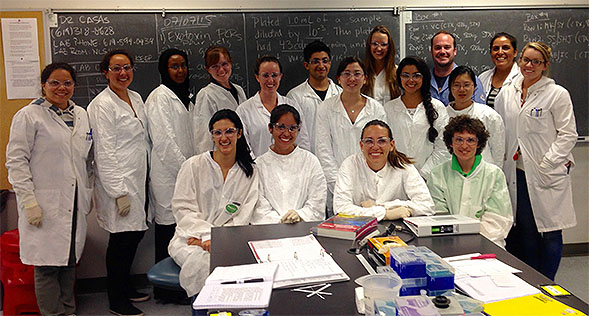Research Ready
A program within the College of Sciences invites top up-and-coming student researchers to train in labs across SDSU.

This summer, 14 exceptional undergraduate San Diego State University students have the chance to train with experienced faculty through the Keck Training Program.
Funded by the W.M. Keck Foundation, the intensive summer program gives undergraduate researchers the chance to apply theory to practice.
Through hands-on training, the Keck scholars are introduced to a wealth of research methods, including environmental sampling, laboratory methods, computer simulation and mathematical modeling. Over the course of the six-week program, students gain valuable skills through workshops on scientific writing and responsible conduct of research.
“The scientific world is always changing, so we teach our students to be adaptable,” said Veronica Casas, the Keck program coordinator and an adjunct faculty member in the microbiology department at SDSU. “We encourage them to broaden their research interest scope and teach the importance of interdisciplinary collaboration.
SDSU is classified by the Carnegie Foundation as a doctoral-granting institution with high research activity and its faculty receive more than $100 million annually in external grant funding. For eight years, the university has organized an annual Student Research Symposium, at which students present their research on topics relevant to their areas of study.
Diving in
The Keck program was originally created to entice incoming freshman into the world of research. Due to interest from a variety of students, the program expanded to accommodate transfer and current students, in addition to freshmen.
Each year, the program selects a new research topic to focus on. This summer, students selected their own research topics for individual projects around the topic of global climate change and its effect on emerging infectious diseases.
While the topic is focused, the interdisciplinary skills taught broaden students' understanding of how science will be done in the future in order to tackle global questions and issues,” Casas said.
Next generation scholars
Because the program caters to undergraduate researchers, the ultimate goal is to prepare the students to work in labs upon completion of the program. Many students earn permanent positions in SDSU research labs at the end of the summer program.
More than 30 students have graduated from the Keck program since it began in 2011, and five of those students graduated from SDSU in May.
Keck Scholars were accepted to graduate school in world-renowned labs, including the Cellular and Molecular Sciences Gateway Program at the University of California, Irvine; the University of California, San Diego, Skaggs School of Pharmacy; the University of California, Santa Cruz, chemistry and biochemistry graduate program; and SDSU’s environmental sciences graduate program.
"Participating in the program really jumpstarted my educational career at SDSU," said Tess Condeff, a senior biology major. "I learned how laboratories are run and also got to become a working member of the lab for the duration of the program."
After participating in the program, Condeff joined SDSU's Center for Microbial Sciences as a research assistant.
2015 Keck Scholars
- Norhan Alhajarr, junior, biology
- Annabelle Burruss, sophomore, environmental science
- Irma Cubas, freshman, kinesiology
- Mariah Foley, senior, biology
- Joanna Garcia, junior, chemistry
- Su Huijan, senior, biology
- Waqas Kayani, sophomore, biology
- Madison Kennedy, junior, chemistry
- Holly Norman, sophomore, microbiology
- Harrison Pearce, sophomore, chemical physics
- Celeste Romero, sophomore, biology
- Savannah Sawaged, senior, biology
- Brendon Woodworth, senior, biology
-
Sara Yusef, sophomore, engineering
About the Foundation
The W.M. Foundation focuses on Science and Engineering Research; Medical Research; Undergraduate Education; and Southern California. Each of the grant programs invests in people and programs that are making a difference in the quality of life, now and for the future.
By funding the work of leading researchers, the establishment of unique laboratories and research centers and the purchase of sophisticated instruments, the foundation strives to laythe groundwork for breakthrough discoveries and new technologies that will save lives, provide innovative solutions to complex problems and add immeasurably to our understanding of life on Earth and our place in the universe.



